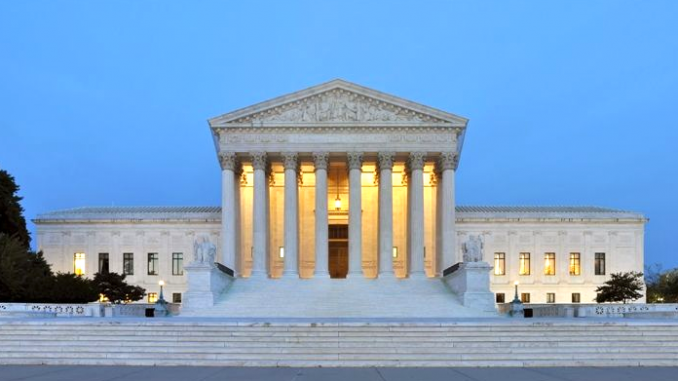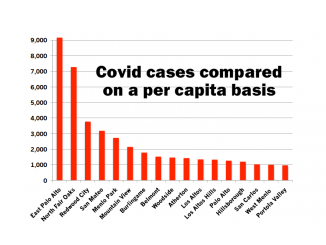
From staff and wire reports
The U.S. Supreme Court has ruled that California can’t bar indoor church services because of the pandemic, but Santa Clara County officials say the ruling doesn’t apply to their ban on indoor gatherings.
The nation’s highest court issued orders late Friday in two cases where churches in Southern California had sued over coronavirus-related restrictions imposed by Gov. Gavin Newsom.
Chief Justice John Roberts wrote that “federal courts owe significant deference to politically accountable officials” when it comes to public health restrictions, but he said deference “has its limits.”
Despite the ruling, Santa Clara County says that all indoor gatherings remain prohibited.
“Santa Clara County’s Local Health Orders are structured in a fundamentally different way than the state’s rules that were the subject of last night’s U.S. Supreme Court decision,” said an unsigned statement from county’s Emergency Operations Center and Public Health Department. “The county has consistently taken a neutral, across-the-board, risk-based approach to curbing Covid-19 that comports with the requirements of last night’s Supreme Court decision. Therefore, all indoor gatherings remain prohibited at this time due to their risk.”
While county officials contend their ban is “neutral,” they have aggressively prosecuted churches that defied the county’s rules.
The county has hit Calvary Temple in San Jose with $1.6 million in fines for holding church services in defiance of the county ban. The church has until Feb. 19 to submit a social distancing plan or it will face additional fines.
Pastor Mike McClure said at a Jan. 28 court hearing that the church’s services are essential at this time. He said he has heard from people suffering from anxiety, depression and even thoughts of suicide. “Calvary’s services have provided a place of refuge for many hurting people in the County,” McClure told the court.
Ban on singing, chanting
In a partial victory for Gov. Gavin Newsom and Santa Clara County Health Director Sara Cody, the Supreme Court declined to stop a ban on indoor singing and chanting. California had put the restrictions in place because the virus is more easily transmitted indoors and singing releases tiny droplets that can carry the disease.
The justices were acting on emergency requests to halt the restrictions from South Bay United Pentecostal Church in Chula Vista and Pasadena-based Harvest Rock Church and Harvest International Ministry, which has more than 160 churches across the state.
Chief Justice Roberts wrote that California’s determination “that the maximum number of adherents who can safely worship in the most cavernous cathedral is zero — appears to reflect not expertise or discretion, but instead insufficient appreciation or consideration of the interests at stake.”
In addition to Roberts, Justice Neil Gorsuch and Justice Amy Coney Barrett also wrote to explain their views. Gorsuch and Justice Clarence Thomas would have kept California from enforcing its singing ban. Barrett, the court’s newest justice, disagreed. Writing for herself and Justice Brett Kavanaugh, she said it wasn’t clear at this point whether the singing ban was being applied “across the board.”
She wrote that “if a chorister can sing in a Hollywood studio but not in her church, California’s regulations cannot be viewed as neutral,” triggering a stricter review by courts. The justices said the churches who sued can submit new evidence to a lower court that the singing ban is not being applied generally.
The court’s three liberal justices dissented, saying they would have upheld California’s restrictions. Justice Elena Kagan wrote in a dissent for herself, Justice Stephen Breyer and Justice Sonia Sotomayor that the court’s action “risks worsening the pandemic.”
Sotomayor said that the court was “making a special exception for worship services” rather than treating them like other activities where large groups of people come together “in close proximity for extended periods of time.”
“I fervently hope that the court’s intervention will not worsen the nation’s Covid crisis. But if this decision causes suffering, we will not pay. Our marble halls are now closed to the public, and our life tenure forever insulates us from responsibility for our errors. That would seem good reason to avoid disrupting a state’s pandemic response. But the court forges ahead regardless, insisting that science-based policy yield to judicial edict,” Sotomayor wrote.
Charles LiMandri, an attorney for South Bay United Pentecostal Church, said in a statement that he and his clients were “heartened by this order” and “thank the high court for upholding religious liberty.”
Liberty Counsel’s Mat Staver, who represents Harvest Rock Church, said in a statement that he and his clients would “continue to press this case until religious freedom is totally restored.”
The court’s action follows a decision in a case from New York late last year in which the justices split 5-4 in barring the state from enforcing certain limits on attendance at churches and synagogues. Shortly after, the justices told a federal court to reexamine California’s restrictions in light of the ruling.




Remarkable that Santa Clara County would think that it is not subject to the rulings of the U.S. Supreme Court. What is this, the People’s Republic of Santa Clara County? Our health officer, Dr. Cody, has truly gone rogue, disregarding the First Amendment and now the nation’s highest court. It’s time to fire her.
I agree. It is very sad that Dr. Cody thinks she is above the law. Hopefully, she will be found in contempt of the courts just like she and the county did against the churches. With no data or science to prove church lockdowns are effective (even after a year of the pandemic and despite repeated attempts to get data), stop saying that church lockdowns are based on science.
Dr Cody, County Executive Jeff Smith and Supervisor Joe Simitian have gone rogue if they think they can ignore the Supreme Court. We need to replace them with people who will obey the law and the Constitution.
“The county has consistently taken a neutral, across-the-board, risk-based approach.”
Really? If congregating in a large room is prohibited, why is Costco still open?
This is the height of arrogance from an already incredibly arrogant and punishing county health department.